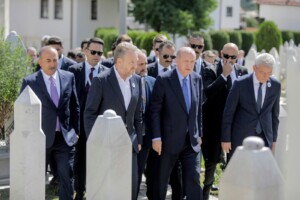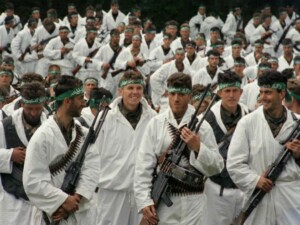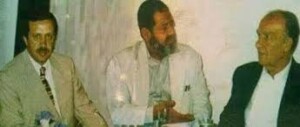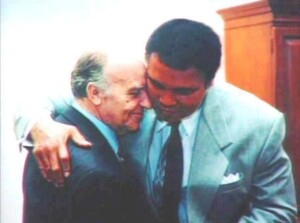Posted by: Ahmad Jomaa
Seventeen years ago today, a man responsible – by the permission of Allāh – for saving countless lives, lost his own. After a life of difficulty, war, imprisonment, and activism, Alija Izetbegović (rahimahu Allāh) took his final breath and returned to the mercy of Allāh on the 19th of October 2003.

The former 1st Chairman of the Presidency of Bosnia and Herzegovina steered his people through their darkest times, and indeed some of the darkest times for the entire Muslim Ummah.
His funeral in the capital Sarajevo was attended by thousands. World leaders across the globe expressed their condolences at his loss.[1] His grave is often visited by notable leaders paying their respects.[2]

Izetbegović was an immensely influential politician, lawyer, and author who lived to write several books on Islamic politics. His book Islam Between East and West and his essay The Islamic Declaration carried his views on the place of Islam in the modern and westernised world. Today, almost two decades after his death, it is worth revisiting how this great man lived.
Alija Izetbegović was born on 8th August 1925 in the town of Šamac, only two years after the official end of the Ottoman Empire.[3] Izetbegović was born in the family of a bey (the Ottoman aristocracy). [4] Originally from Belgrade, his family moved to Šamac, where Izetbegović’s grandfather became a mayor who was highly regarded for his honesty and fairness.
Alija Izetbegović’s father, who fought in the First World War for the Austro-Hungarian army on the Italian front, was a merchant and banker. When Alija was around two years old, his father moved the family to Sarajevo.
Alija’s mother, Hiba, was said to be a pious woman, and Alija stated that it was her influence that planted in him the seeds of his religious convictions.
In his teens, Izetbegović attended the First Boys’ Grammar School, where he was exposed to new influences from his teachers and peers. During this time, he passed through a phase exploring the merits of communism, philosophy, and various ideologies. However, after a few years of spiritual and intellectual exploration, Alija returned to Islam with new strength and a deeper understanding of the world around him, having been well-read in the philosophical works of Hegel, Spinoza, Kant, and others.
It is worth noting here that it was this period in his intellectual development that Izetbegović would later credit for his firm conviction in Islam throughout his life, and for his rejection of atheism. In his memoirs, Izetbegović wrote: “The universe without God seemed utterly pointless to me.”
Such a phase is not unique to Izetbegović. Many great Muslim thinkers throughout the history of Islam passed through a period of exploration where they would delve into the sciences of contradictory ideologies only to come through with Islam as the champion of their hearts and minds.
Even ‘Umar b. Al-Khattab predicted in his time that the Ummah would face challenges from those who were raised only in Islam and had never seen the true nature of jāhiliyya and its evils.[5]
Izetbegović lived to see his home invaded during the Second World War. The Ustaše, a Croatian ultranationalist terrorist organisation that invaded Sarajevo, enforced a harsh Nazi regime. The invaders forced many young men into military service, but Izetbegović dodged the draft and spent most of 1944 in hiding, before escaping to his native Sava valley region.
During the war, Izetbegović joined an organisation called Mladi Muslimani, or the ‘Young Muslims’. This was a social movement focused on political and spiritual issues faced by the collapsed Muslim Ummah at the time. The group aimed to uplift the Muslim community in Bosnia and to reconnect them with their identity. The group believed that “the state of politics in the Muslim world is wretched and unsustainable, while Islam is a living idea that can (and should) be modernized, without losing any of its essence.”[6]
After World War II, Izetbegović graduated from the University of Sarajevo’s Faculty of Law with a degree in law.[7] During this time, his activism earned him a reputation as a staunch anti-communist.[8]
It was around this time in 1946, when Alija was in his early twenties, that he was first arrested for calling for religious freedom and human rights. His political stance – in contradiction to the communist authorities – earned him a sentence of three years. Three years later, Izetbegović was imprisoned again for a further five years due to his active support for the Young Muslims.[9]
After enjoying a period of growing popularity, the Young Muslims eventually split into two factions: one in support of the Handschar Division of the Waffen-SS, and the other siding with the Yugoslav communists.
Although the reality of Alija’s political views are to this day entrenched in his writings, his reputation was still smeared by the baseless accusation that he had joined the SS. This resulted in his arrest by the Yugoslav communists. A controversial article in the New York Times[10] made the unfounded claim that Alija had joined the Nazi sympathetic Ustaše movement, in spite of his well-documented flight from the invasion. Alija’s family have strongly denied these claims,[11] and his arrest was in fact due to his political opposition to the communists and the sharing of his own political views.[12]
Allāh decreed that Alija Izetbegović would spend a significant portion of his youth (and indeed much of his life) behind bars. However, it is perhaps in these times that he cultivated and refined his political vision for the future for Bosnia.
His history on the frontline of civil rights activism, his education, and his first-hand experience in the dynamic world around him led Izetbegović to publish his pollical manifesto The Islamic Declaration in 1970. In this work, Izetbegović explores the nature of Islamic politics in the context of modern Western scholarship, discussing the nature between Islam, the Ummah, legislation, economics, and governance.
In The Islamic Declaration, Izetbegović makes it clear that true Islamic governance can only exist in a majority Muslim nation: “Islamic order can be realized only in those countries in which Muslims represent the majority of the population … Muslim minorities within non-Islamic communities, conditional on a guarantee of religious freedom and a normal life and development, are loyal and duty bound to observe every obligation to that community with the exception of those harming Islam and Muslims.”[13]
In no uncertain terms, Izetbegović stated that his writings were hypothetical in nature. However, Izetbegović’s manifesto – commended by Western diplomats for its refinement and thoughtfulness – was interpreted by the former communist authorities of Yugoslavia as a call for ‘implementing Sharia law’ in an ‘ethnically pure’ Bosnia-Herzegovina[14] (an unfounded accusation faced by Western Muslims to this day).[15] As a result, Izetbegović’s writings were banned and he once again found himself sentenced behind bars, this time for 14 years. But Alija ended up spending less than half of that time in prison as he was released in 1988 while communist rule began to fall apart.
Within a year of his release, and as Yugoslavia transitioned into a multi-party system, Izetbegović founded the Party of Democratic Action, or Stranka Demokratske Akcije, which became the largest Muslim majority political party in the country and still holds that title today.[16] At the time, the Bosnian constitution stipulated that each of the constituent nations would have a representative elected to a rotating presidency in a seven-member multi-ethnic cycle. With a Croatian as prime minister and a Serbian as president of the Assembly, the Bosnian representative Izetbegović – after a life of marginalisation and political exclusion – became the first Chairman of the Presidency.
Sadly, however, this milestone was overshadowed as ethnic tensions grew. The breakout of violence between Serbs and Croats in neighbouring Slovenia and Croatia in 1991 lead to a breakdown in the multi-ethnic government. It was clear that it would only be a matter of time before the bloodshed came to Bosnia.
In pursuit of a united Bosnian state, and in hopes of preserving peace, Izetbegović led his people to an independence referendum held on the 29th of February, and again on the 1st of March 1992.[17] The vote was a landslide, with a 64% turnout and a 99.7% majority voting for independence. Just over a month following the referendum, the independence of Bosnia and Herzegovina became internationally recognised. [18]
However, this independence was rejected by the Serbian leadership, and the looming civil war came to Sarajevo at last. What followed was the one of the most brutal conflicts of the century, with the longest siege on a capital city in modern history.

On the 11th of July 1995, Serbian troops slaughtered more than 8000 Muslims at Srebrenica in a disgraceful genocide, the harrowing details of which have been covered in previous Islam21c articles.[19]

It was during this horrifying time that Izetbegović held his nation together, leading the Bosnians through the storm. Yet in spite of the brutality faced by the Bosnian people, Izetbegović remained a humanitarian at heart, with an immensely honourable reputation among world leaders globally.

In the words of the late British political giant Paddy Ashdown: “I first met Alija Izetbegović in July 1992. I met him regularly during the war years, frequently in the shell-battered presidency building in Sarajevo. Since May 2002, when I began my work as the International Community’s High Representative for Bosnia-Herzegovina, I have asked him for help as one of the key figures in this country’s fitful reconstruction. That request was never denied. We did not always agree, but I know that he was committed to the peaceful reconstruction of a Bosnia-Herzegovina which could be part of Europe and in which all its citizens could feel at home.”
“He was tough, scholarly and serious. He lived a simple life and he had little of the opportunistic charm or coarse joviality that are hallmarks of political operators in the Balkans and elsewhere,” Ashdown added, “Izetbegović, of all the leaders I dealt with during the war, was a man who conveyed only angst when confronted by the tragedy of conflict in Bosnia-Herzegovina – he was devoid of the cynicism or vanity that marked other war leaders. History will no doubt say that not all his decisions were right, but more than anybody else he was responsible for the fact that Bosnia-Herzegovina survived.” [20]
After great human efforts on the negotiation tables, the Dayton Agreement was finally signed on the 1st of November 1995. This put an end to three and half years of bloody conflict, but it was only the beginning for Izetbegović, who was now faced with the momentous task of rebuilding Bosnia.
Following the conflict, Bosnia was devastated and left with a complicated political system in need of reform. At the first post-war elections, Izetbegović was once again elected a member of the Presidency of Bosnia and Herzegovina. He served his nation for five more years before stepping down in October 2000 at the age of 75 due to his deteriorating health. Almost three years after his resignation, Izetbegović passed away.
Izetbegović is fondly remembered by his people by the name ‘Dedo’, which means grandfather in Bosnian. His mark on the nation will never be forgotten, and his reputation and legacy are honoured around the world. Izetbegović lived a hard life and experienced some of the worst periods in modern history, yet he never spent time feeling sorry for himself. He remained focused, determined, and hardworking all of his life.

It is easy for minorities who face hardship and persecution to adopt a hopeless mentality of victimisation and weakness. But this has never been the way of the prophets or the great men of our Ummah. All hardships we face are a challenge through which Allāh is giving us no option but to grow and be stronger.
In Sahīh al-Bukhāri, it is recorded that the Companion Khabbāb b. Al-Arat, who was known for the horrendous scars he bore from torture at the hands of the polytheists, narrated:
“We complained to Allāh’s Messenger (sall Allāhu ‘alayhi wa sallam) [of the persecution inflicted on us by the infidels] while he was sitting in the shade of the Ka`ba, leaning over his burd [covering sheet]. We said to him, “Would you seek help for us? Would you pray to Allāh for us?” He said, “Among the nations before you was a [believing] man who would be put in a ditch that was dug for him, and a saw would be put over his head and he would be cut into two pieces, yet that [torture] would not make him give up his religion. His body would be combed with iron combs that would remove his flesh from the bones and nerves, yet that would not make him abandon his religion. By Allāh, this religion [Islam] will prevail until a traveller from Sanaa to Hadramawt will fear none but Allāh, or a wolf as regards his sheep, but you [people] are hasty.”[21]
We are not from the people going through the hardest of times. We are not going through what the Companions went through, nor are we facing, by the mercy of Allāh, the hardships faced by our Muslim brothers and sisters in the past and present. We are simply witnessing the hardships of others. We have no excuse to sit by and do nothing while we feel sorry for ourselves. Our responsibility is simply to reject injustice, by hand if possible, by our words if not, and at the very least to oppose them in our hearts.
Izetbegović is known to have said: “My life was so fast, so eventful. I’ve done so many things. In hindsight, I have the feeling of having lived three lives. It’s too much for one man.”
“If I were offered the chance to live again, I would refuse it. But if I were to be born again, I would choose my life exactly as I’ve lived it.”[22]
We ask that Allāh (subḥānahu wa taʿālā) grants Alija Izetbegović (rahimahu Allāh), and all those who were killed unjustly Jannat al-Firdaus and that He brings about much greater good for their people in this world and the next.




